#Ionic Apps
Explore tagged Tumblr posts
Text
Benefits Of Ionic Mobile Application Development for businesses in Florida
Mobile applications have become an essential part of modern business strategy. As technology continues to evolve, businesses in Florida need to keep up with the changing market trends to stay competitive. Ionic mobile application development Florida is a popular choice for businesses looking to develop mobile apps. In this blog post, we will discuss the benefits of Ionic mobile application development for businesses in Florida.
Cross-Platform Compatibility
Ionic mobile application development offers cross-platform compatibility, which means that the same codebase can be used to create applications that work on both Android and iOS devices. This allows businesses in Florida to target a wider audience with their mobile applications.
Quick Development Process
Ionic mobile application development offers a quick development process, which means that businesses in Florida can get their mobile applications to market faster. The development process is faster because it uses a single codebase, and the app can be tested on multiple platforms simultaneously.
Cost-Effective
Ionic mobile application development is a cost-effective solution for businesses in Florida. As the same codebase is used for both Android and iOS devices, the development costs are significantly reduced, and businesses can get a mobile application to market quickly.
Rich User Interface
Ionic mobile application development offers a rich user interface, which means that businesses in Florida can provide a seamless user experience to their customers. The user interface is based on AngularJS, which is a powerful JavaScript framework, and this allows developers to create visually appealing and engaging applications.
Access to Native Features
Ionic mobile application development allows access to native features such as the camera, GPS, and accelerometer. This means that businesses in Florida can develop mobile applications that have the same capabilities as native applications.
Community Support
Ionic mobile application development has a large community of developers and enthusiasts, which means that businesses in Florida can access a wealth of knowledge and resources. This community support ensures that businesses can stay up-to-date with the latest trends and best practices in mobile application development.
Easy Maintenance
Ionic mobile application development offers easy maintenance, which means that businesses in Florida can update their applications quickly and efficiently. As the same codebase is used for both Android and iOS devices, updates can be rolled out simultaneously, saving time and resources.
In conclusion, LotzAp Solutions is the Ionic mobile application development company in Florida that offers several benefits for businesses in Florida. It is a cost-effective solution that offers cross-platform compatibility, a quick development process, rich user interface, access to native features, community support, and easy maintenance. With these benefits, businesses in Florida can create engaging and effective mobile applications that cater to the needs of their customers.
2 notes
·
View notes
Text
Hire Ionic Developers
YES IT Labs makes app development effortless—hire Ionic Developers for fast, efficient, and engaging hybrid applications.

#hire ionic programmers#ionic developers for hire#hire ionic app developer#hire ionic developers#hire ionic developer
0 notes
Text
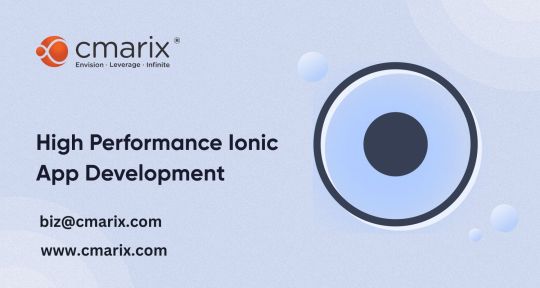
Bring your mobile app vision to life with Ionic app development by CMARIX. Specializing in crafting fast, responsive, and user-friendly cross-platform apps, CMARIX's Ionic development services offer seamless performance on both iOS and Android. With expertise in leveraging the Ionic framework’s extensive UI components and flexible functionality, CMARIX ensures your app stands out with a polished look and feel.
0 notes
Text
Innovative Dreame Hair Dryer: Revolutionizing Smart Home Experience
The smart home industry is rapidly evolving, and Dreame, a leading brand in the field, is at the forefront of this revolution. Their latest offering, the Dreame Hair Dryer, is a game-changer for anyone seeking a seamless and convenient grooming experience.
Designed with cutting-edge technology, the Dreame Hair Dryer seamlessly integrates with your smart home ecosystem, allowing you to control it with voice commands or through a dedicated app. Imagine being able to dry your hair while multitasking or even while your hands are occupied with other tasks – the Dreame Hair Dryer makes it possible.
But that's not all. This innovative hair dryer boasts advanced features that elevate your hair care routine. With multiple heat and speed settings, you can customize the airflow to suit your specific hair type and desired style. Additionally, the built-in ionic technology helps reduce frizz and static, leaving your locks smooth and shiny.
What truly sets the Dreame Hair Dryer apart is its sleek and modern design. Crafted with premium materials, it not only looks stylish but also ensures durability and longevity. The ergonomic handle and lightweight construction make it comfortable to use, even during extended drying sessions.
By embracing the Dreame Hair Dryer, you're not just investing in a cutting-edge grooming tool; you're embracing the future of smart home living. Imagine the convenience of managing your entire home with a simple voice command or a tap on your smartphone – the possibilities are endless.
#smart home#Dreame Hair Dryer#grooming experience#voice commands#app integration#advanced features#heat settings#speed settings#ionic technology#frizz reduction#modern design#premium materials#durability#ergonomic handle#lightweight#convenience
0 notes
Text
Unlock Mobile Success with Xamarin, React Native, and Ionic App Development Services by Hidden Brains
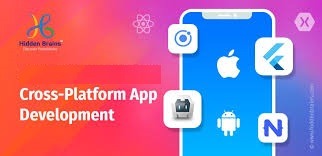
In today’s fast-paced digital world, businesses are constantly looking for efficient ways to develop high-quality, cross-platform mobile apps that resonate with users. Hidden Brains, a leading Xamarin mobile app development company in India, offers robust solutions tailored to business needs. With services spanning across frameworks like Xamarin, React Native, and Ionic, Hidden Brains provides dedicated developers to help transform your app ideas into reality.
Why Choose Hidden Brains for Cross-Platform Mobile App Development?
Choosing the right technology stack is crucial for app success. With Hidden Brains, you get access to expert developers who excel in building reliable and scalable mobile applications. Whether you’re looking to hire Xamarin developers in India, hire dedicated React Native developers, or hire Ionic app developers in India, Hidden Brains has got you covered.
Benefits of Cross-Platform App Development with Hidden Brains
Cost-Effective SolutionsDeveloping apps for multiple platforms can be expensive. Hidden Brains utilizes cross-platform frameworks like Xamarin, React Native, and Ionic to deliver cost-effective solutions, ensuring your app performs seamlessly across devices.
Faster Time-to-MarketIn a competitive market, timing is everything. By choosing Hidden Brains, a trusted React Native app development company in India, you get a faster time-to-market. Our developers use single codebases across platforms to expedite the development process.
Access to Skilled DevelopersHidden Brains provides a pool of talented developers who understand the nuances of each platform. When you hire dedicated React Native developers or hire Ionic app developers in India, you are guaranteed expertise and quality.
Xamarin Mobile App Development for Versatility
Xamarin is a popular choice for businesses that want native-like performance in a cross-platform application. As a premier Xamarin mobile app development company in India, Hidden Brains delivers secure, high-performance apps that enhance user experience.
Native User Experience: Xamarin allows near-native performance, making it ideal for apps requiring high-quality visuals.
Shared Codebase: The framework uses C# and .NET, reducing development time and enabling updates with ease.
Seamless Integration: Xamarin apps can integrate smoothly with various APIs, making them suitable for enterprise-level applications.
Hire Xamarin Developers in India: Why It’s the Right Choice
When you hire Xamarin developers in India through Hidden Brains, you access expert developers skilled in this versatile framework. Here’s why you should consider Xamarin for your next project:
Reduced Cost: Xamarin uses a single codebase, saving development costs.
Faster Development: Speed up your launch with Xamarin's streamlined approach.
Quality Assurance: Hidden Brains ensures that Xamarin apps are thoroughly tested for bugs and performance.
React Native App Development: Perfect for High-Performance Apps
React Native is a popular choice for companies aiming to build dynamic and high-performance applications. Hidden Brains, a reliable React Native app development company in India, provides robust solutions that guarantee user satisfaction and engagement.
Reusable Code: React Native allows code to be reused across platforms, reducing time and costs.
Third-Party Integrations: Enhance app functionality with plugins and APIs.
Efficient Updates: React Native’s “hot reloading” feature allows developers to make updates instantly, improving the development experience.
Hire Dedicated React Native Developers for Custom Solutions
When you hire dedicated React Native developers from Hidden Brains, you get experts focused on delivering customized solutions that align with your business goals.
Tailored to Your Needs: Our React Native developers adapt to your business needs, providing custom features and functionalities.
Timely Delivery: With dedicated resources, you get quicker turnaround times.
Seamless Communication: Our dedicated developers work closely with you, ensuring that your vision is at the forefront of development.
Ionic App Development for Lightweight, Web-Based Solutions
Ionic is ideal for building lightweight, high-performance mobile apps. Hidden Brains is a leading Ionic app development company in India, providing cost-effective and efficient solutions.
Browser-Based Development: Ionic uses web technologies like HTML, CSS, and JavaScript, making it suitable for web-based mobile apps.
Smooth UI/UX: Ionic’s pre-built components and themes streamline the UI/UX design process.
High Performance: Ionic’s integration with Cordova and Capacitor enables access to native device features, boosting app functionality.
Hire Ionic App Developers in India for Cost-Effective Solutions
Looking to build an app on a budget? When you hire Ionic app developers in India through Hidden Brains, you can achieve powerful results without breaking the bank.
Efficient Development: Our Ionic developers leverage Ionic’s modular components, reducing development time and costs.
User-Centric Design: Ionic enables a sleek user experience that resonates with your target audience.
Cross-Platform Compatibility: Ionic apps work seamlessly across multiple devices, giving you a wider reach.
Why Hire from Hidden Brains?
Choosing Hidden Brains means partnering with a team committed to delivering outstanding mobile solutions. Here’s what makes Hidden Brains the preferred choice:
Proven ExpertiseWith a track record of successful projects, Hidden Brains brings expertise to each project, ensuring high-quality results.
Transparency and CommunicationWe keep you informed at every stage of the project, allowing seamless collaboration and transparency.
Scalable SolutionsOur solutions are designed to grow with your business. Whether it’s a small-scale project or a large enterprise app, we adapt to meet your evolving needs.
Conclusion
Whether you’re looking to hire Xamarin developers in India, hire dedicated React Native developers, or hire Ionic app developers in India, Hidden Brains offers the expertise, cost-efficiency, and quality needed to make your project successful. Our services help businesses achieve their goals by delivering high-performing, cross-platform applications that resonate with users. Unlock your mobile app’s potential with Hidden Brains and stay ahead in the competitive digital landscape.
#xamarin mobile app development company india#hire xamarin developers in india#react native app development company india#hire dedicated react native developer#hire ionic app developer india
0 notes
Text
Cutting-Edge Ionic App Development for Innovative Mobile Solutions
Harness the power of Ionic for your mobile applications with our specialized Ionic App Development Services. As a leading Ionic App Development Company, we create dynamic and engaging cross-platform apps that provide a seamless user experience across devices. Our dedicated team is committed to delivering tailored solutions that meet your business needs and exceed your expectations. Transform your vision into reality with our expert Ionic app development!
0 notes
Text

Top Ionic Developers for Hire | Elevate Your Mobile App | AIS Technolabs
Ready to develop a cutting-edge mobile app? HIre our Ionic developers experts in crafting smooth, cross-platform experiences that engage users and perform flawlessly. Hire our talented developers today and bring your vision to life with expert guidance and support.
#ionic developers#Mobile App Development#Cross Platform Apps#hire developers#ionicframework#app development#techtalent#mobiledevelopment#Ionic#App Development Services
0 notes
Text
Frontend Development for Mobile Apps with Frameworks like Ionic or React Native
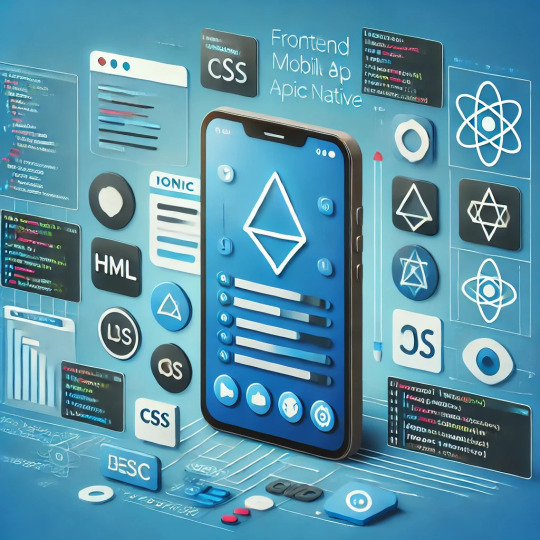
In today's fast-paced digital world, businesses are increasingly seeking efficient ways to build high-quality mobile apps. Frontend development plays a crucial role in creating responsive and user-friendly mobile applications. Two popular frameworks for mobile app frontend development are Ionic and React Native. Both frameworks allow developers to build cross-platform apps, reducing development time and cost. In this article, we’ll explore how these frameworks work and the benefits they offer for mobile app development.
What is Frontend Development in Mobile Apps?
Frontend development focuses on the user interface (UI) and user experience (UX) of an application. For mobile apps, this involves creating interactive elements like buttons, menus, and layouts that users interact with. With the increasing demand for mobile apps, businesses need to deliver seamless user experiences across different platforms, including iOS and Android. This is where frameworks like Ionic and React Native come in.
Why Choose Cross-Platform Frameworks for Mobile App Development?
Building separate apps for iOS and Android can be time-consuming and expensive. Cross-platform frameworks like Ionic and React Native allow developers to write a single codebase that works on both platforms. This not only speeds up the development process but also reduces maintenance efforts. Here are the benefits of using these frameworks:
Cost Efficiency: With a single codebase, companies save money on development and updates.
Faster Development: Developers can launch apps quicker by writing code once and deploying it across platforms.
Consistent UI/UX: Ensures a unified look and feel on both iOS and Android devices.
Ionic Framework for Mobile App Development
Ionic is an open-source framework that uses web technologies like HTML, CSS, and JavaScript to build mobile apps. It's built on top of Angular and integrates well with Apache Cordova, enabling access to native device features like the camera and GPS.
Key Features of Ionic:
Cross-Platform Compatibility: Build apps that run smoothly on both iOS and Android.
Pre-Built UI Components: Ionic offers a wide range of ready-made components, speeding up the design process.
Native Plugin Integration: Access native device functionalities through plugins, without writing native code.
Web View: Apps are rendered in a web view, making it easier for web developers to transition to mobile app development.
Advantages of Ionic:
Perfect for developers familiar with web technologies.
Large community support with extensive documentation.
Fast prototyping for MVP (Minimum Viable Product) development.
React Native for Mobile App Development
React Native, developed by Facebook, is another powerful framework for building cross-platform mobile apps. Unlike Ionic, which uses web technologies, React Native allows developers to write native code for both platforms using JavaScript. This provides better performance compared to web-view-based frameworks.
Key Features of React Native:
Native Components: React Native renders real native components, ensuring faster performance.
Hot Reloading: Developers can instantly see changes without recompiling the entire app.
JavaScript and React: Leverages JavaScript and the popular React library, making it easier for web developers to adopt.
Third-Party Plugins: React Native has a rich ecosystem of third-party plugins for extended functionality.
Advantages of React Native:
Near-native performance for both iOS and Android apps.
Reusable components across platforms.
Large developer community and regular updates from Facebook.
Ionic vs React Native: Which One to Choose?
Choosing between Ionic and React Native depends on the specific needs of your project. Here are some points to consider:
Performance: If performance is critical and you need a near-native feel, React Native is the better option.
Development Speed: For rapid prototyping and building MVPs, Ionic is faster due to its pre-built UI components and web-based architecture.
Familiarity with Technologies: If your team is experienced with Angular, Ionic is an easier choice. If they are more familiar with JavaScript and React, then React Native would be the better option.
The Future of Mobile Frontend Development
The demand for cross-platform mobile apps is growing, and frameworks like Ionic and React Native are at the forefront of this trend. As technology evolves, these frameworks continue to improve, offering better performance, more features, and easier integrations with backend systems. The future of frontend mobile development lies in the ability to create high-performance, cost-effective, and user-friendly apps that work seamlessly across all devices.
Conclusion
Both Ionic and React Native are powerful tools for frontend mobile app development. Choosing the right framework depends on your project’s goals, timeline, and the expertise of your development team. If you're looking to develop a mobile app that offers fast performance, cost efficiency, and a seamless user experience, either of these frameworks can be a great choice. Explore both options and see which fits your needs best for building high-quality mobile apps.
#Frontend mobile app development#Ionic framework for mobile apps#React Native for cross-platform apps#Cross-platform mobile app development#Mobile app frameworks#JavaScript for mobile apps#Ionic vs React Native#Mobile UI/UX development#ahextechnologies#reactnative#ionic
0 notes
Text
Boost Your Ionic App’s Performance: Top Optimization Tips
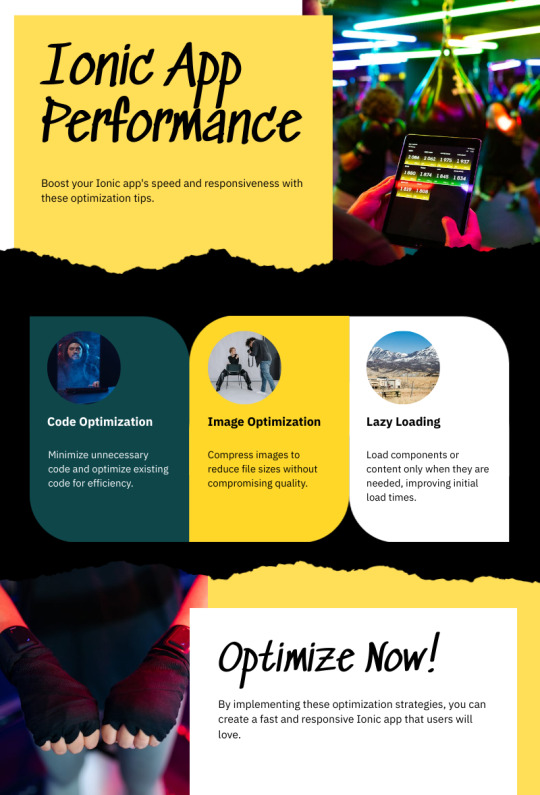
Optimizing your Ionic app for maximum performance is crucial to ensure a smooth user experience. Start by minimizing your app's initial load time through lazy loading, which loads components only when needed. Use Ahead-of-Time (AOT) compilation to reduce the size of your app and improve its startup speed.
Optimize images and use compressed formats like WebP to save bandwidth. Leverage caching strategies and service workers to provide offline capabilities and faster subsequent loads.
Regularly test your app’s performance using tools like Lighthouse and implement feedback. Finally, keep your app’s dependencies updated to benefit from the latest performance improvements and security patches.
For more Ionic Mobile App Development Services, click here.
0 notes
Text
Ionic Mobile App Development Company
EitBiz excels in ionic mobile app development company, creating dynamic, high-quality apps that enhance user engagement and performance. Let us transform your ideas into powerful mobile solutions with our expert team.
0 notes
Text
Nevina Infotech is a top-notch Ionic app development company with years of proven expertise and experience building future-ready app development services.
0 notes
Text

Experience the power of seamless integration with IONIC app development! Our expert team ensures your app provides a superior user experience across all platforms. Let's build something amazing together! 🔗Learn more: https://greyspacecomputing.com/ionic-mobile-app-development-services/ 📧 Visit: https://greyspacecomputing.com/portfolio/
#IONIC#GreySpaceComputing#CrossPlatform#MobileApp#AppDevelopment#ionicframework#webdevelopment#IONICIntegration#mobileapps#UserExperience#apps#PerformanceBoost#appdevelopment#apppresser#appbuilding#customapps#plugins#ecommerce#iosapps#androidapps#developers#wordpressdevelopers#phonegap#pushnotifications#wordpressmobileapp#iosappdev#androidappdev#wordpressmobileapps#ionic#android
1 note
·
View note
Text
Best Frameworks for Cross-Platform App Development
What is a cross-platform app development?
Cross-platform app development as the name suggests, is a method which enables developers to build mobile apps for multiple operating systems, such as iOS and Android, from a single code base. These apps are platform-agnostic, meaning they can be used regardless of the OS powering the mobile device.
This is in contrast to native app development, which requires different codebases for each platform. By simplifying the development process, it saves time, effort, and cost, which appeals to companies that want to reach a broader audience with their mobile offerings. It also ensures a consistent user experience across devices and platforms, making it a more efficient way to develop applications.
What is a cross-platform app development framework?
A cross-platform app development framework is a dedicated toolkit that allows developers to build mobile applications for various operating systems using just one codebase.
Instead of writing separate code for each kind, you can use a cross-platform development framework that keeps development costs low. Because cross-platform apps may run on multiple devices, it's a great method to reach a wider audience. Nowadays, almost all other strategies employ a cross-platform approach.
A cross-platform strategy is now widely used by every other startup and well-known large company. It ensures a consistent user experience across all platforms, which aids in their effective problem-solving when developing mobile applications.
Best Cross-Platform App Development Frameworks
Flutter
Google's Flutter, an open-source UI toolkit, was officially released in December 2018 and has since become a leading multi-platform technology due to its single codebase approach, enabling seamless creation of natively compiled applications across platforms. If you're looking to hire Flutter developers, they can leverage this powerful framework.
Ionic
Ionic, launched in 2013, is a free, open-source framework for creating cross-platform apps. Its mobile SDK allows developers to write code once and use it on Windows, iOS, and Android. With new tools and features added over time, Ionic has become a popular choice for Android and iOS mobile app development. Companies often hire Ionic developers to take advantage of this versatile framework.
React Native
Introduced by Facebook in 2015, React Native is an open-source framework that allows mobile engineers to build hybrid native/cross-platform apps using JavaScript. It offers access to third-party UI libraries with ready-to-use components and enables apps for Android and iOS. Companies frequently hire React Native developers to leverage its time-saving capabilities and immediate code changes via Fast Refresh.
Xamarin
Developed by Microsoft in 2011, Xamarin is a framework that allows developers to share up to 90% of their code across major platforms. With over 1.4 million developers, it's easy to hire Xamarin developers familiar with this technology. Its native-friendly interface and controls simplify app creation, making Xamarin a key aspect of cross-platform mobile development.
Node.js
Node.js, created in 2009, is an open-source framework primarily used for server-side and network application development. Built on Google's V8 JavaScript Engine, it offers a powerful runtime environment and a rich library of JavaScript modules. Its non-blocking, event-driven architecture and extensive NPM ecosystem make it a popular choice.
Unity
Unity is a popular mobile app creator, known for its user-friendly interface and effectiveness. It's versatile for animation, architectural design, and movie scenes. Unity's drag-and-drop functionality allows users to create elements without advanced coding skills, simplifying app and game development for everyone, including non-coding experts.
Sencha Touch
Sencha Touch is a web-based cross-platform app framework known for its efficiency and reliability in creating reliable UI components and libraries. Sencha Ext JS is a cross-platform framework for creating HTML5 apps for desktops, tablets, and mobiles, using the Ext JS JavaScript library. It is particularly useful for data-rich business apps and real-time web applications.
Firebase
Firebase, an independent company founded in 2011 and acquired by Google in 2014, is a popular Backend-as-a-Service (BaaS) platform with features like real-time database, authentication, cloud storage, hosting, and machine learning. It is a popular cross-platform app development framework, offering services and tools for quick application development, deployment, and management.
NativeScript
NativeScript is an open-source framework for creating native-like apps for iOS and Android using JavaScript. It supports native APIs like Xcode and Android Studio, promoting code reuse and speedy development. NativeScript is ideal for "Write Once, Run Anywhere" functionality and allows developers to easily incorporate plugins from NPM into their projects.
0 notes
Text
Best Ionic app development agency in UK
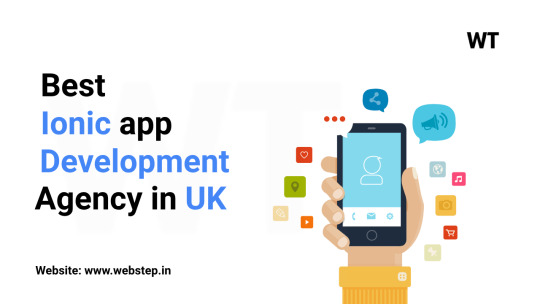
In the dynamic realm of mobile app development, finding the right partner can make all the difference between a successful venture and a missed opportunity. Amidst the myriad of choices in the UK market, one company shines as the beacon of excellence in Ionic app development — WEBSTEP. Renowned for its expertise, innovation, and commitment to quality, WEBSTEP has earned its reputation as the best Ionic app development agency in UK. In this comprehensive guide, we will delve into what sets WEBSTEP apart and why it’s the go-to choice for businesses seeking top-notch Ionic app solutions.
Why Ionic App Development? In the ever-evolving landscape of mobile app development, businesses are continually seeking innovative solutions to stay ahead of the curve and engage with their audience effectively. Among the plethora of options available, hybrid Ionic app development has emerged as a compelling choice for companies aiming to strike the perfect balance between efficiency and excellence. In this article, we’ll explore why Ionic app development is a game-changer in the world of mobile apps.
Cross-Platform Compatibility: One of the standout features of Ionic app development is its ability to create cross-platform applications that run seamlessly on multiple devices and operating systems. By leveraging web technologies like HTML, CSS, and JavaScript, Ionic allows developers to write code once and deploy it across various platforms, including iOS, Android, and the web. This cross-platform compatibility not only streamlines the development process but also maximizes the reach of the app, ensuring broader accessibility for users.
Native-Like User Experience: While hybrid apps traditionally struggled to match the performance and user experience of native applications, Ionic has changed the game with its native-like UI components and themes. With Ionic, developers can create apps that not only look but also feel like their native counterparts, thanks to a rich library of pre-designed UI elements and animations. This ensures a smooth and immersive user experience across different platforms, enhancing user satisfaction and retention.
Rapid Development: Time-to-market is critical in today’s fast-paced business environment, and Ionic excels in accelerating the app development process. By providing a comprehensive set of tools, plugins, and ready-made components, Ionic empowers developers to build feature-rich apps quickly and efficiently. Moreover, Ionic’s intuitive development environment and robust community support further streamline the development workflow, allowing businesses to launch their apps faster and gain a competitive edge in the market.
Cost-Effectiveness: In addition to speed, Ionic app development offers significant cost advantages compared to native app development. Since Ionic apps are built using web technologies, developers can leverage their existing skills and resources, eliminating the need for specialized knowledge or separate development teams for each platform. This results in lower development costs and faster ROI for businesses, making Ionic an attractive option for startups and small to medium-sized enterprises with budget constraints.
Scalability and Maintainability: As businesses grow and evolve, scalability and maintainability become paramount considerations for their mobile applications. Ionic’s modular architecture and built-in tools for testing, debugging, and performance optimization make it well-suited for scaling applications as demand increases. Furthermore, Ionic’s active community and regular updates ensure ongoing support and maintenance, keeping apps up-to-date and competitive in the long run.
In conclusion, WEBSTEP stands out as the best Ionic app development company in UK, offering businesses a simple yet effective solution to meet their mobile app needs. With a focus on simplicity and efficiency, WEBSTEP provides tailored Ionic app development services that empower businesses across various industries to succeed in today’s digital landscape. From enhancing customer engagement to streamlining operations and driving growth, WEBSTEP’s expertise in Ionic app development ensures that businesses can achieve their goals with ease.
#ionic app development#ionic app development company in UK#Ionic application services#ionic app developers#webstep#webstep technologies
1 note
·
View note
Text
0 notes
Text
Where can I hire a dedicated Ionic app developer?
Are you looking for dedicated Ionic developers? Your search ends with MarsDevs. At MarsDevs, we don't just hire developers; we curate a fellowship of cross-platform maestros who dance effortlessly between the iOS and Android realms.
Click here to know full answer: https://www.quora.com/Where-can-I-hire-a-dedicated-Ionic-app-developer/answer/MarsDevs-2
0 notes